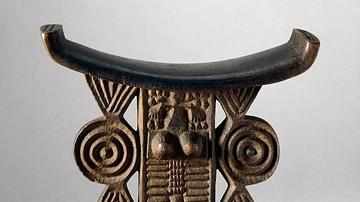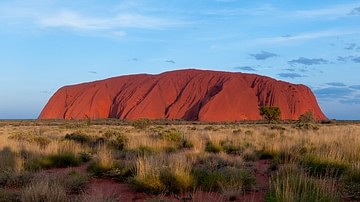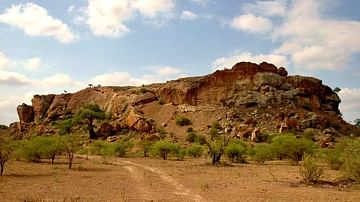Search Definitions
Browse Content (p. 158)

Definition
Mutapa
Mutapa (aka Matapa, Mwenemutapa, and Monomotapa) was a southern African kingdom located in the north of modern Zimbabwe along the Zambezi River which flourished between the mid-15th and mid-17th century CE. Although sometimes described as...

Definition
Uluru
Uluru (also known as Ayers Rock and pronounced: ool-or-roo) is a large natural sandstone rock formation located in the Northern Territory of Australia. It stands at a massive 348 meters tall and measures a lengthy 9.4 km in width. The sandstone...

Definition
Mapungubwe - The Great Iron Age Kingdom of Southern Africa
Mapungubwe, located in the very north of South Africa just below the Limpopo River, was an Iron Age settlement and kingdom which flourished between the 11th and 13th century CE. It was perhaps southern Africa's first state. Mapungubwe, whose...

Definition
Great Zimbabwe
Great Zimbabwe is a ruined city near Masvingo, central Zimbabwe which was inhabited between c. 1100 to c. 1550 (flourishing c. 1300 - c. 1450) in the region’s Late Iron Age. Capital of the Kingdom of Zimbabwe of the Bantu-speaking Shona people...

Definition
Hanseatic League
The Hanseatic League (also known as Hansa, Hanse, 1356-1862 CE) was a federation of north German towns and cities formed in the 12th century CE to facilitate trade and protect mutual interests. The league was centered in the German town of...

Definition
Songhai Empire
The Songhai Empire (aka Songhay, c. 1460 - c. 1591) covered what is today southern Mauritania and Mali. It replaced the Mali Empire (1240-1645) as the most important state in West Africa. Originating as a smaller kingdom along the eastern...

Definition
Denisovan
The Denisovans are an extinct group of fossil humans who, along with their sister group the Neanderthals, also share an ancestor with Homo sapiens. Thus far, they are known only from Denisova Cave in the Altai Mountains in Siberia, where...

Definition
Ghana Empire
The Ghana Empire flourished in West Africa from at least the 6th to 13th century. Not connected geographically to the modern state of Ghana, the Ghana Empire was located in the western Sudan savannah region (modern southern Mauritania and...

Definition
Mali Empire
The Mali Empire (1240-1645) of West Africa was founded by Sundiata Keita (r. 1230-1255) following his victory over the kingdom of Sosso (c. 1180-1235). Sundiata's centralised government, diplomacy and well-trained army permitted a massive...

Definition
Sundiata Keita
Sundiata Keita (aka Sunjaata or Sundjata, r. 1230-1255) was the founder of the Mali Empire (1240-1645) in West Africa. A prince of the Malinke tribe, Sundiata would not only overthrow the rule of the kingdom of Sosso (c. 1180-1235), the biggest...